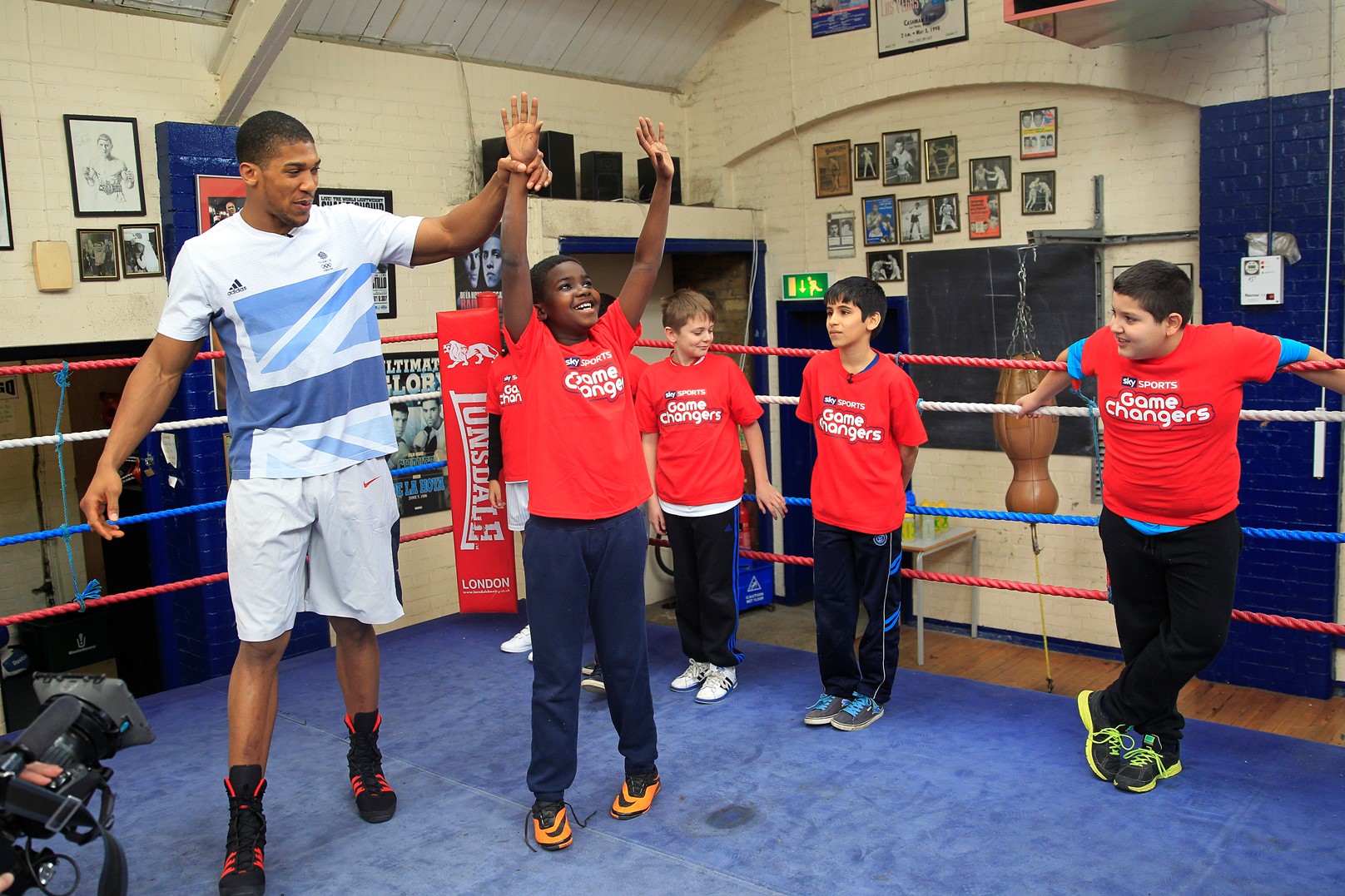In an era of growing youth obesity and a perceived lack of discipline among young people, one of Britain’s biggest sports stars is calling for a return of a once-popular activity to the school curriculum – boxing.
Anthony Joshua, the reigning Olympic and professional heavyweight boxing champion, is urging education leaders to reinstate the teaching of boxing in schools across the country.
The 24-year-old knockout artist, who burst onto the global boxing scene with his gold medal victory at the 2012 London Olympics, believes the sport can play a vital role in instilling crucial life lessons in the next generation.

Teach them a lesson: Anthony Joshua laid on a masterclass for a group of kids and says boxing should be taught in schools
“Years ago there used to be boxing in schools which would help with discipline, self-defence and confidence,” Joshua said. “I really believe we need to bring that back.”
Joshua’s rallying cry comes amidst growing concerns over the physical and mental wellbeing of young people in the UK. Childhood obesity rates have skyrocketed in recent decades, with one in three children now classified as overweight or obese by the time they leave primary school.

Packing a punch: Joshua has an unbeaten record in all four of his professional fights so far
Moreover, reports have highlighted alarming trends of anti-social behavior, poor self-esteem, and a lack of focus among youth – problems that Joshua believes boxing can help address.
“Boxing teaches you so much more than just how to throw a punch,” the champion explained. “It’s about dedication, hard work, respect for yourself and others. These are traits that are invaluable, not just in sport, but in life.”
Joshua’s calls to reintroduce boxing into schools have been welcomed by teachers, parents, and youth organizations who have witnessed first-hand the transformative impact the sport can have.
“I’ve seen it so many times – kids who were struggling with their confidence, getting into trouble, even experimenting with crime,” said Tom Baker, the head coach at a community boxing gym in London. “Then they find boxing and it’s like a complete turnaround. Suddenly they’ve got discipline, purpose, and a genuine sense of pride.”
Baker, who has worked with at-risk youth for over 15 years, believes the lessons learned in the boxing gym are ones that cannot be easily taught in a classroom setting.
“There’s something about the physicality of boxing, the intensity of the training, that just hits home in a way that other activities can’t,” he said. “When you’re putting in that hard work, pushing your body to its limits, you learn an incredible amount about yourself.”

Rule Britannia: Joshua won the men’s super heavyweight gold medal at the 2012 Olympic Games in London
For many young people, particularly those from underprivileged backgrounds, the boxing gym can provide a sanctuary – a safe space to channel their energy in a positive direction under the guidance of dedicated coaches.
“A lot of these kids are dealing with really challenging home lives, things like poverty, family breakdown, lack of role models,” Baker explained. “The boxing club becomes like a second home for them, somewhere they know they’ll be looked after and pushed to be their best.”
This sentiment is echoed by Joshua, who credits his own time in the amateur boxing system as pivotal in shaping him into the champion and role model he is today.
“Boxing was a real lifeline for me growing up,” Joshua reflected. “It gave me focus, discipline, a sense of belonging. Most importantly, it gave me confidence in myself and my abilities.”
The London 2012 gold medalist believes reintroducing boxing to schools could have a profound impact on young people struggling with similar challenges.
“So many kids today are lacking that guidance, that positive influence in their lives,” he said. “If we can get boxing back into schools, we’re not just giving them a great form of exercise – we’re equipping them with s𝓀𝒾𝓁𝓁s that will stay with them forever.”

Head-to-head: Joshua traned a group of students as part of his role in Sky’s ‘Game Changers’ show
Beyond the physical and mental benefits, Joshua also believes boxing’s return to the school curriculum could have a broader societal impact, helping to tackle issues like violence, crime, and antisocial behavior among youth.
“Boxing isn’t just about fighting, it’s about control, about channeling your aggression in a productive way,” the champion explained. “If we can get young people into the sport, teaching them the right values, that’s going to have a ripple effect far beyond the boxing gym.”

Joshua’s passion for reinvigorating school-based boxing programs has not gone unnoticed by education authorities, who are cautiously exploring ways to reintroduce the sport.
“We recognize the potential benefits that boxing can have for young people, both in terms of health and personal development,” said a spokesperson for the Department of Education. “However, any reintroduction would need to be done in a safe, responsible manner with robust safeguarding measures in place.”
Such concerns are understandable given the inherent risks involved in contact sports. But Joshua believes these can be effectively managed through proper coaching, equipment, and supervision.
“Of course, safety has to be the number one priority,” he acknowledged. “But boxing isn’t some reckless, uncontrolled activity. When it’s taught properly, with the right guidance, it’s an incredibly valuable life s𝓀𝒾𝓁𝓁.”

With Joshua’s star power and the backing of teachers, parents, and youth organizations, the campaign to bring boxing back to schools appears to be gaining momentum. And for the champion himself, the potential impact extends far beyond the confines of the classroom.
“This isn’t just about getting kids fit or teaching them to throw a good punch,” Joshua said passionately. “It’s about giving them the tools to be confident, disciplined, resilient individuals who can go on to achieve great things.
“That’s the legacy I want to leave – not just as a boxer, but as someone who helped change young people’s lives for the better.”





